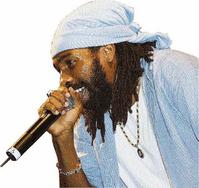Carolyn Johnson and Krista Henry, Gleaner Writers

Spragga Benz.
With gospel artistes singing and deejaying on dancehall rhythms, the Christian arena is seen to be treading a thin line between the faith and the secular music industry.
To the minds of most, dancehall music is less than holy in content, beat, culture and expression. The debate, then, is if whether or not a gospel artiste should be singing on a secular/dancehall rhythm. For many gospel artistes, the answer is a resounding 'yes', as songs such as Salvation Story by Moses on the popular 'Eighty Five' riddim, Shelly Thunder's Heathen on the 'Church Heathen' rhythm, or Prodigal Son's Love God Bad on the Sleng Teng, enjoy airplay.
One gospel artiste enjoying tremendous success is Calvin 'Prodigal Son' Whilby, who sees no problem with gospel artistes deejaying on secular riddims.
Words, not rhythm

Gospel artiste Moses.
He explains that it is not the rhythm but the words that make music gospel. "I don't have a problem with people ministering on whatever riddim. A man can say God and im nah talk bout Jesus. He can say Jah, can talk about Jehovah God or Selassie. I believe singing gospel is broken down into different stages - the life, the death, the burial and resurrection of Jesus Christ," Prodigal said.
He claims that it is singing in this context that sets gospel music apart. While Prodigal uses his own rhythms, he will also voice for other producers as Christians have to be strategic enough to sing on rhythms that reach the 'unsaved.'
His gospel deejay counterpart DJ Nicholas has a different take on the matter. "If it's a case where a producer calls you to do a gospel song on a riddim initially launching, it's a good medium to minister the gospel. If it already out there and tainted, known for a particular song and I am going to jump on it and try to Christianise it, different thing. After a riddim out there and tainted with slackness, when you play a song people hear that song it look like you a follow hype," he said.
Gospel selector Marlon Young from FAME FM questions the labelling that has been placed on music. "People take the focus off God and putting it on the riddim," he said. "How can somebody determine if a riddim is secular or gospel? How we know is not God inspire the person to do the riddim and use gospel artiste to reach a lot of people? If a man comes with a nice, catchy riddim that thousands of people like and a song these thousands of people listen to that praise God, what is the problem? If you know within yu heart say you a praise God, how the riddim come in? The riddim not changing the message," he said.
Producer Craig Harrisingh from DASECA asks, if a secular artiste can voice about God on a rhythm, then what is different about a gospel artiste voicing a song on the same juggling rhythm?
Even though it seems simple to artistes and producers in the business, there are those that still strike out against the practice. According to gospel producer Danny Brownie, he has faced backlash from persons who disagree with his music. "The main criticism come from within the church, traditionalists who don't embrace what we doing in the general sense," he told The Sunday Gleaner.
His response has been that "I'm not concerned about criticism. [My] mandate is to take the message of Christ to the four corners of the world. The riddim is a vehicle we use. If we are wrong and it goes dead I will praise God with those who criticise. If it goes out and blesses somebody I bless God jus the same," he said.
Same purpose
But while some in Christendom is sceptical, secular artistes embrace the practice. Dancehall artiste Spragga Benz believes that gospel artistes should be welcomed to perform on secular riddims. "Me nuh tink de elders shud a really fight it. A de same purpose, a God dem a praise, a nuh gun dem a sing bout. Dem a mek dem own music a praise God in dem own way a mek dem joyful noise. Riddim a riddim, music a music, so any riddim dem waan get dem message out on. Supposed is a secular riddim a go convert the nation? Dem haffi go thru the medium wey de yutes dem listen," he said.
One listener of secular music, Lex, believes that having gospel artistes on dancehall rhythms appeals to persons like himself. "Anything to get the word out. You have a set of people who listen to hard dancehall stuff and dem nuh really into the traditional gospel songs, 'as the deer panteth for the water', those type of songs. They love the Jamaican vibes, the Jamaican riddim. So if yu can get a artiste fi drop a gospel song on a dancehall riddim it good, 'cause it a promote the word," he said.

